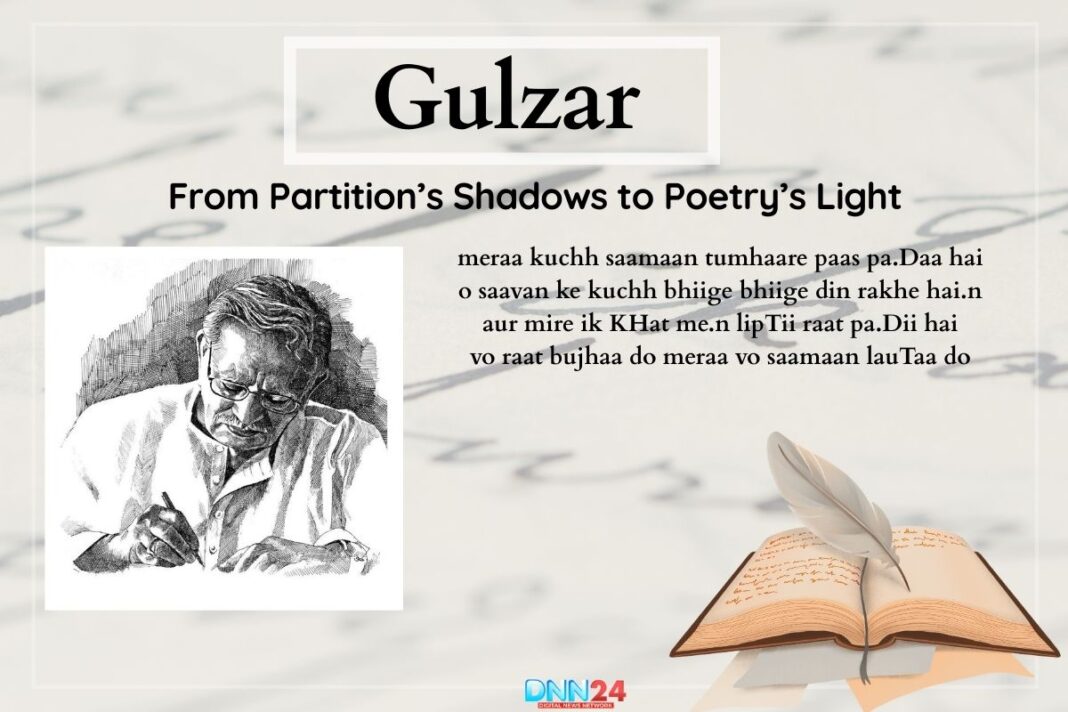Gulzar, born Sampooran Singh Kalra on 18 August 1934 in Dina (now in Pakistan), began life in a world suddenly torn apart by the Partition of India. His family migrated as refugees over the blood-stained borders of 1947, with the memories of burnt houses, riots, and displacement.
din kuchh aise guzarta hai koi
Gulzar
jaise ehsan utarta hai koi
These scars of segregation did not fade away and were reiterated in other works, such as Raavi Paar and Footprints on a Zero Line. At one point, he admitted that he did not choose to write about Partition but rather to exorcise pain: to transform personal pain into art that could bring collective relief.
sham se aankh mein nami si hai
Gulzar
aaj phir aap ki kami si hai
Orphaned young, with his mother gone and a distant father, Gulzar grew up in loneliness. He used to sleep in the storeroom of his father’s small Delhi shop, reading by the faint light of a chimney lamp, Tagore and Sharat Chandra. He did not succeed in formal education, but life became his real teacher—teaching him resilience, humility, and the strength to find hope in words.
hath chhuTen bhi to rishte nahin chhoDa karte
Gulzar
waqt ki shaKH se lamhe nahin toDa karte
Mechanic To Lyricist: Greasy Dreams
When he landed in Bombay, it was survival. Gulzar worked as a garage mechanic, painting cars by day while secretly writing poetry at night. His verses were not greasy, but his hands were full of monsoon rains, childhood memories, and silent heartbreaks.
KHushbu jaise log mile afsane mein
ek purana KHat khola anjaane mein
And then fate interfered. Through friends, Gulzar got a chance to write a song for Bimal Roy’s film Bandini. He delivered his debut song, Mora Gora Ang Layee Le, an immediate hit. Bimal Roy saw his talent and asked him to give up the garage and take up poetry. The mechanic who used to clean off grease every night was now moulding words that would be carried in the hearts of millions.
dard halka hai sans bhaari hai
jiye jaane ki rasm jari hai
Loss, Loneliness and Secret Scars
Life was not spared to him even as success came. When his father passed away, Gulzar could not afford a flight home. He missed the funeral, having travelled by train, long enough to regret the fact, many years later. Later, when his mentor Bimal Roy died, Gulzar performed his cremation rites, merging his grief for both a father and a teacher into one solemn farewell.
zindagi yun hui basar tanha
Gulzar
qafila sath aur safar tanha
This loneliness had not, however, made him hard. He converted wounds to narratives: the pickpockets, widows, mothers, refugees—ordinary people and extraordinary silences. His poems and short stories became not only literature but also silent acts of healing, lessons that there is dignity even in despair.
sabr har bar iKHtiyar kiya
hum se hota nahin hazar kiya
Cinema of Courage and Compassion
Not content with poetry alone, Gulzar entered filmmaking. His debut, Mere Apne (1971), was about a widow uniting restless youths. Later, his films such as Koshish, Aandhi, Mausam, and Angoor showed his unusual boldness in dealing with social change, disability, political insurrection, and human weakness.
ek parwaz dikhai di hai
teri aawaz sunai di hai
His movie Aandhi, which was daring in its depiction of a female politician, was banned during the Emergency, but it has not lost its relevance today.Unlike many in cinema, Gulzar never chased glamour. He has tried various things, mixing poetry and cinema, translating Shakespeare in Angoor, and eternalising Ghalib in a television series.
sham se aaj sans bhaari hai
be-qarari si be-qarari hai
His friendships with Shailendra, S.D. Burman and R.D. Burman contributed to Indian music with some of the finest and lasting songs. They were poems without a song, and yet they were words, like a whisper, like a storm, sometimes.
jab bhi ye dil udas hota hai
Gulzar
jaane kaun aas-pas hota hai
The Living River: Gulzar Today
Now in his nineties, Gulzar continues to write daily—poems, scripts, children’s rhymes, and reflections. He continues to think of words as raindrops: sometimes they fall on dry ground, sometimes they evaporate. His magic is in the unique combination of the simplicity of a mechanic, the wonder of a child and the courage of a survivor.
Gulzar
be-sabab muskura raha hai chand
koi sazish chhupa raha hai chand
The fact that he became a world icon despite being a child of a refugee is a lesson that art is not created out of privilege but rather out of persistence, pain and honesty. For aspiring artists, Gulzar’s story is proof that: It is resilience that is important, not recognition; failure and loneliness are the fertile ground for greatness.
wo KHat ke purze uDa raha tha
Gulzar
hawaon ka ruKH dikha raha tha
Authenticity lives beyond trends- his simplicity and depth made him have an eternal voice.Art is medicine for the artist and the listener—his poems were a sanctuary to millions.Through heartbreak, exile, rejection, and triumph, Gulzar’s life remains a living poem—forever revising itself and flowing like a river. His story says a most gloomy road can be turned into light, music, and hope.
bite rishte talash karti hai
Gulzar
KHushbu ghunche talash karti hai
Gulzar’s Philosophy: Silence, Simplicity, and the Power of Everyday
For Gulzar, poetry is not about ornamentation—it is about capturing the rhythm of daily life. He frequently tells us that the minutest of things, such as a child’s laughter, a bird’s halt at a window, or the smell of wet earth, are the greatest truths. Unlike poets who soar into abstraction, Gulzar walks close to the ground, gathering words from the dust of life. His diction is simple, but his lines are haunting echoes in the heart.
aisa KHamosh to manzar na fana ka hota
Gulzar
meri taswir bhi girti to chhanaka hota
In interviews, he confessed to having silence as his best friend. Because of silence, he learnt to listen more than to talk. His writing was informed by silence, and silences are as important as words. His poems are not proclamations but confessions, and they have the intimacy of a whispered word and the power of a gale.
aankhon mein jal raha hai pa bujhta nahin dhuan
Gulzar
uThta to hai ghaTa sa barasta nahin dhuan
A Partition Poet, but a Healing Poet also
Though Partition haunted him, Gulzar never allowed his work to be consumed by bitterness. Instead, he was in search of healing. His book Raavi Paar is a record of the violence and displacement of 1947, yet it also has hope and strength. His poetry is an insistence in a time of division along borders and a remembrance of shared humanity.
phul ne Tahni se uDne ki koshish ki
Gulzar
ek tair ka dil rakhne ki koshish ki
To him, memory is not only pain; it is responsibility. He thinks that a writer should be a mirror to distress and opportunity. That is why his work seems timeless—it is anchored in the past but has a message in the present.
ruke ruke se qadam ruk ke bar bar chale
Gulzar
qarar de ke tere dar se be-qarar chale
Mentor, Colleague and Friend
What makes Gulzar special is not only his brilliance but also his generosity toward others. He fostered younger poets and musicians and helped them discover their voices. He produced songs with R.D. Burman that changed the musical scope of Hindi cinema. He made a bridge between two generations with Vishal Bhardwaj by demonstrating the possibility of coexistence of tradition and modernity.
koi KHamosh zaKHm lagti hai
Gulzar
zindagi ek nazm lagti hai
Friends tell how he is kind and tough, quiet and very loving. He does not usually court publicity, and his words are more likely to go further than his name.
gulon ko sunna zara tum sadaen bheji hain
Gulzar
gulon ke hath bahut si duaen bheji hain
Global Recognition, Yet Rooted in Humility
Over the years, Gulzar has received countless awards—Padma Bhushan, Sahitya Akademi Award, Dadasaheb Phalke Award, Grammy, and even an Academy Award (Oscar) for Slumdog Millionaire’s Jai Ho. But when asked about fame, he waves it off with a grin. In his opinion, awards are not the ends but the milestones. His real reward is when a reader or a listener says, This line is the same as my own life.
sahma sahma Dara sa rahta hai
Gulzar
jaane kyun ji bhara sa rahta hai
Despite global acclaim, Gulzar remains deeply Indian at heart. His works still embrace and fuse Urdu, Hindi, and Punjabi culture. He has demonstrated how languages are no walls but bridges—and how art is for everybody.
koi aTka hua hai pal shayad
Gulzar
waqt mein paD gaya hai bal shayad
Legacy: A River That Flows Beyond Generations
Today, Gulzar stands as one of the last living legends of India’s golden era of art and literature. But his work is not mere memory, it is living, topical and is reinvented over and over again by younger generations. From children’s poems like Gulzar Ke Dohe to his haunting ghazals and thought-provoking films, his influence stretches across audiences of all ages.
hum to kitnon ko mah-jabin kahte
Gulzar
aap hain is liye nahin kahte
To the literary student, he is a lesson in style. He is an integrity role model to filmmakers. To the common reader and hearer, he is a friend in solitude and an ally in cheerfulness. His poems move off the pages and the monitors into lives as lullabies, confessions, prayers and revolutions.
kahin to gard uDe ya kahin ghubar dikhe
Gulzar
kahin se aata hua koi shahsawar dikhe
Gulzar, the Eternal Gardener of Words
Gulzar describes himself simply as a gardener of words. He plants poems like seeds, not knowing what will grow, or he doesn’t believe that some will. The story of his life as a refugee boy to one of the most adored poets in the world is evidence that creativity does not come out of privilege but out of perseverance, humility, and risk-taking.
kanch ke pichhe chand bhi tha aur kanch ke upar kai bhi
Gulzar
tinon the hum wo bhi the aur main bhi tha tanhai bhi
When he wrote about poetry, he said, “Poetry is not written, it happens.” Through him, it still goes on, weaving our nightmares, healing our griefs, and telling us that no matter how broken a life may be, we can still sew it back to some semblance of perfection with the strands of beauty.
Also Read: Talib Chakwali: A Life Woven in Words, Loss, and the Search for Meaning
You can connect with DNN24 on Facebook, Twitter, and Instagram and subscribe to our YouTube channel.



